October 2016: M* is upset with me for a good reason. Two reasons, actually.
Reason number 1: I’m in town and I didn’t call her to hang out.
Over the course of our 12-year friendship, M* has come to visit me countless times. I’ve never visited her.
Even so, the lack of balance isn’t why she’s upset. She’s upset because she recently moved to Boston and learned – via a Facebook photo – that I’m nearby and didn’t let her know.
She calls to ask, “Jason, why the heck didn’t you let me know you’re in town? That stings.”
Reason number 2: I answer her question honestly.
My mind races with excuses. I could tell her, “I’m not actually in Boston! That photo was taken ages ago,” or “I was going to surprise you,” or “I was actually just about to call you, OMG!!!”
But these would be lies
Instead, I tell her the truth: I forgot she lived in Boston.
For the past few years, she’s lived on the West coast; her move East slipped my mind.
She was hurt that I forgot about this huge life event.
Then, something crazy happened: I realized that even though she was upset with me in the moment, it didn’t change the fact that she still wanted to be my friend.
For many people, this wouldn’t be a profound realization, but for me, it was. The people pleaser in me is forever worried that if I upset someone, they’ll no longer think I’m worth their time.
***
My personal challenge for 2016 was to go the entire year without telling a lie, blurring the truth, or deceiving people.
This meant that I needed to be as honest as possible in both word and action. It also meant that I needed to prioritize speaking my truth over being agreeable.
The commitment to truth profoundly changed my life. In this article, I’ll cover how the challenge worked and how it affected my business, relationships, and sense of self. I’ll also explain how you can do your own honesty challenge and the results you can expect.
Lying is self-loathing (and we all do it)

Everyone lies.
We exaggerate our stories to make them better, claim to be busy to get out of commitments, and act like we love our friend’s shitty poetry.
We round up when discussing our height, income, and bench press, and we round down when asked about our weight, ETA, and time spent watching TV.
We lie through our actions by staying in dead relationships, taking calls from people we don’t care about, and pretending to give a shit.
We lie to ourselves too; claiming that we’re happy, confident, and just fine when really, we’re fucking miserable, misguided, and apathetic.
The question is: why do people lie?
We lie because we are afraid that we aren’t worthy of love. We lie because we fear that people won’t take us seriously. We lie because we are uncomfortable with our reality. We fear that if we show the world (and ourselves) who we truly are, it won’t go well.
So we pad the truth, blur the lines, omit a few details, avoid the hard conversations, and keep our mouths shut. The hope is that this fictional version of who we are will be worthy of love and that no one, ourselves included, can tell the difference between the two.
While lying offers emotional protection, it also makes it difficult for people to love the real you. You become suspicious of others’ affection because you can’t tell if it’s directed at you or the person you’re pretending to be.
When you commit to telling the truth, you create the opportunity for people to love the real you.
Blurry realities: the 2 ways we lie without realizing it

Telling the truth is more complicated than is immediately obvious. Whenever we blur our reality by providing vague answers (as opposed to giving crisp definition) we are being deceptive.
There are at least two ways that people blur reality without understanding they’re lying.
1) Allowing the truth to lead to false conclusions. You can easily deceive people without ever lying to them.
For example, the following is true: I make more money per hour than a doctor.
This statement should lead you to believe that I also make more per year than a doctor, but I don’t. I don’t even come close.
I spend about five hours a week doing billable work. Doctors spend 40+ hours/week doing billable work. They make way more per year than I do, even though I make much more per hour.
2) Lying through omission, false agreeableness, and avoidance. Lying through omission happens when we intentionally withhold information or misrepresent our reality.
We’re all familiar with obvious omissions, like failing to tell your accountability buddy that you ate half a pizza last night simply because she didn’t ask. But far more impactful are the subtle lies of withheld information that quietly define our lives. These generally happen through action or inaction, rather than words.
If you are pretending to agree with someone or avoiding hard conversations, you are lying through omission by withholding your truth.
For example, if you’re in a dead relationship but acting like everything’s fine, you’re lying to your partner. You’re avoiding the hard conversation the two of you need to have.
How the year of the honesty challenge worked

With all of that in mind, here are the guidelines I set out to follow for the year of honesty:
- I am not allowed to lie, either blatantly or through blurred realities. If I do lie, I must correct myself as soon as I realize it. I was at dinner with a friend, and he was considering the kimchi soup, which I really wanted to try. I said, “I hear that’s really good. You should get it!” In reality, I hadn’t heard anything about the soup; I just wanted him to order it so I could eat some. When I realized I lied to my friend, I said, “Shit. Sorry. I lied to you. I haven’t heard anything about the soup. What I should have said is that it looks awesome, and I want you to order it so I can try some.”He ended up ordering the soup because he liked the idea of sharing.
- No white lies. Many people believe that telling white lies is polite and compassionate. While I understand the logic, I think it’s flawed. When we tell a white lie we are shielding people from reality. If they already know the dress makes them look fat and we lie about it, we’ve undermined their trust. If they genuinely don’t know whether the dress makes them look fat and we deceive them, then we’ve held them back from the chance to understand themselves and improve their lives.
Of course, frame and perspective should be taken into consideration. There’s a very real difference between, “Good lord you look fat” and, “Well, you look beautiful period, regardless of what you’re wearing, but yeah, that dress doesn’t seem to flatter you as much as the black one does.” - Speaking my truth is more important than being agreeable. Though I never had much of a problem speaking my truth on stage, where I was rewarded for it, it’s always felt risky in my personal life. I feared that if my perspective veered too far from my friends’, I might upset them, and they would grow uninterested in spending time with me. In order to remain fully in integrity, I needed to start speaking my truth even when it was uncomfortable.
- I will not use “honesty” as an excuse to be unreasonable, anti-social, or a dick. When a clerk asks, “How are you today?” I will not unload my problems because I want to give her the “honest” answer.
- It’s ok to say, “I’d rather not answer that” when people ask questions I’m not comfortable with.
As expected, following these guidelines became increasingly easy as the year went on. What I didn’t expect was just how profoundly they would affect everything in my life…
How honesty affected my business

Deals closed more quickly. As a consultant, I help people build six figure speaking businesses. Being as honest as possible forced me to set precise expectations during sales calls. I suspect that the high level of clarity differentiated me from my competitors.
For example, nearly everyone asks, “What sort of results are your past clients getting?” One honest answer is, “All of my clients are getting paid speaking engagements.” While this is accurate, it’s also vague.
The year of honesty forced me to offer a much more precise answer. Instead of saying, “I have a 100% success rate,” I started saying, “All of my clients have gotten paid speaking gigs. Most get gigs within 6-7 weeks, and several made over $100,000 in their first year. Still, I can’t promise results like that. Luck is a factor, as is how much time you commit to this. If you do the work, there’s a good chance you’ll land gigs within a few weeks. If you sit around expecting me to do everything, you’ll waste everyone’s time.”
This level of precision seemed to inspire trust in my prospective clients, many of whom signed within a week.
It forced me to close a very lucrative line of business. For a hot minute last year (well ok, six months), I worked as a life coach. I charged a lot for my time and my clients seemed happy to pay it.
It was interesting and engaging work. I enjoyed learning about my clients’ inner realities and helping them step fully into their lives. As time went on, I noticed that many of my clients were treating me like a psychologist, and I was allowing them to do it.
I realized that the issues my clients needed help with were better addressed by a mental health professional. Though I could have kept working as a coach, it would have been deceptive, because I knew I wasn’t truly qualified. So I closed my coaching practice despite the significant income it was generating.
Doing so opened up tons of space in my calendar and allowed me to focus on helping people build speaking businesses. I’m much better at working with speakers than I ever was as a life coach, and I enjoy it more. Perhaps unsurprisingly, the revenue from consulting is outpacing revenue from life coaching.
PSA: my personal opinion is that 99% of the life coaching industry is a crock of shit. Most “life coaches” use their practices as a way to avoid confronting their own demons. Their rough – if unspoken – logic is, “If people hire me to help them with their lives, my life must be awesome.”
If you’re thinking of hiring a life coach, I urge you to consider hiring a therapist instead. Yep, finding a good therapist is hard. I get it. But therapists have extensive training and ethical guidelines that they’re required to conform to while coaches don’t. More on why I think life coaching is a bad idea here.
How honesty affected my relationships

I got closer to the people who mattered. I used to have a nasty habit of holding grudges. I feared that if I had a hard conversation with someone, they would no longer want to be my friend or that their love for me would fade. So instead of asking for what I needed or expressing difficult emotions, I compartmentalized.
I realized that bottling my feelings was a form of dishonesty; it led people to believe that I felt differently than I did. I needed to start getting real, even if it scared me.
Doing so was – and is – hard. Sharing more of myself does create the opportunity for people to learn unappealing things about me. It may even shine light on undiscovered deal breakers between us, but openness also creates the opportunity for real connection. As I learned to be increasingly open with the people in my life, I ended up feeling closer to many of them than ever before.
I learned that raw, vulnerable honesty is the only path to true intimacy. This doesn’t mean you need to open up quickly, and it certainly doesn’t mean that you need to open up to everyone. It just means that if you want real relationships, you have to take the risk of showing people who you really are.
I finally let go of the people who I never liked all that much. There used to be people in my life who I didn’t enjoy spending time with. I’d return their calls and emails from a sense of obligation, not excitement. I realized that this too was a form of lying, and I slowly worked to reshape my circle so that it was filled with people I genuinely enjoy.1
How honesty affected my sense of self

“Live by the foma* that make you brave and kind and healthy and happy. ”
― Kurt Vonnegut, Cat’s Cradle
*Harmless untruths
When I started the honesty challenge, I assumed that the hardest part would be being honest with others.
Nope.
The hardest part – by far – was being honest with myself.
Like many people, I unintentionally filled my life with gentle lies designed to protect myself from the harshness of reality.
Two of the more profound lies I was telling myself:
- I love that I was a child entertainer – it made my life better
- I have a healthy relationship to money
The truth about these issues is much more complicated:
- My experience as a child entertainer was horrible. I hated it. It left permanent scars that I still feel today.
- My relationship to money was toxic. Fortunately, when I stopped lying to myself, I was able to improve it dramatically.
Admitting these things to myself was disorienting. It’s weird to wake up and realize that I’m not the man I thought I was.
My life is messier now that I’m more honest with myself. The artificially clean lines and charmed personal narratives have fallen away. But in their place, I find myself. Happiness takes less effort and I don’t hold myself back or doubt myself as much as I used to.
Of course, it’s easier to keep casting illusions and denying your reality, but doing so disengages you from your life. It embeds pain and friction so close to your core that you don’t even notice it.
When you find the courage to be honest with yourself, life become expansive. You start to learn that in many cases you are already as talented, lovable, and capable as you’ve secretly hoped.
You also learn that sometimes you fall short, that you’re imperfect, and that not all of your dreams will work out. And that’s ok. That just makes you human.
Through it all, you learn that you’re ok and that you can handle whatever is thrown at you. You learn that you have people – good people – to comfort you when you need them. You learn that people love you for you, not for the person you’ve been pretending to be.
So 2016 is over… am I still doing the honesty challenge?
Yep.
Being honest has improved my life more dramatically than any other practice I’ve experimented with. It’s a fast and consistent (albeit difficult) path to self-love. It’s phenomenal for building intimacy. It makes life vivid.
I felt more alive and engaged in 2016 than ever before.
My recommendations to you…
Honesty has a weird habit of starting to feel like a super power when you practice it. It seems to draw the right people and opportunities to you, while speeding up the flow of life.
If you’re interested in doing your own honesty challenge, I suggest experimenting with the behaviors below. For most people, it will be easiest to tackle one change at a time. Once the new behavior becomes natural, move on to the next.
- Eliminate white lies
- Eliminate lies of omission
- Answer questions precisely (as opposed to giving vague answers) or say, “I’d rather not answer that”
- When forced to choose between speaking your truth and being agreeable, lean toward speaking your truth
- Stop lying in entirety
Keep in mind that honesty can be more difficult and complicated than most people expect. We’ve all been conditioned to lie to ourselves and the world. Be sure to be forgiving and gentle with yourself as you evolve.
Footnotes
- For the sake of transparency: I wrestle with whether or not it makes sense to cut people out of my life. Of course, if the person is abusive, manipulative, or just a huge asshole, then cutting ties makes sense. Those who I do cut out, I don’t do so formally. I just stop returning their calls. I know that’s cold, but I feel like it’s important to prioritize my needs. But what about someone who’s difficult, but really needs a friend? What about someone who hurt you in the past, but seems to be genuinely invested in repairing the relationship? I think there’s a lot of grey here.
With great courage comes great rewards
Aint that the truth!
I loved reading this. Thank you.
My pleasure, Grace. So glad to hear it. 🙂
I have a friend who is the male equivalent of a Debbie downer, Glum Gus if you will. He has a habit of bringing up my ex in conversations, and we broke up in 08. I like his girlfriend though, so I don’t know how to reduce that friendship without losing contact with her. We are all part of a larger social circle where there would be awkwardness too if the friendship faded. Yet he confided that some of those people don’t keep in touch with him either.
I experienced being the social outsider in middle school so I get it and don’t want to do that to someone (especially since he is feeling excluded by others ). Yet I try to have / take a positive spin on things. Crazy week at work, job security. Complainy person, maybe they are having a tough week let me give them a break. His perspective, not so much (hence Glum Gus). I have noticed (despite trying to resist) I can fall into mutual work complaining, to comisserate or indicate it’s not that his coworkers have it out for him, we all have stuff happen. I get off the phone with him not my usual up beat self.
The last time I was unemployed I had a chance to meet his girlfriend for lunch, since her schedule has her off on a week day. The plan was lunch, hike, dinner with ‘Gus’ too. He switched his half day that week so we could all hang out. I just wanted to talk to someone who was also an older sister about having little sisters and like girl stuff! I don’t think just hanging out with her is a solution.
Any suggestions?
Hey Jacq – I totally feel ya when you mention not wanting to cut Gus entirely out of your life, but also wanting to keep him at arms length. And it must have been annoying that he just invited himself to hang with you and his girlfriend. My suggestion: be polite and kind towards Gus without being too involved with his life. When he starts bringing you down excuse yourself or just change the topic. If he ever asks why you’re keeping a bit of distance, be honest (and gentle). As far as scheduling time with his girlfriend, tell her, “I so enjoy spending time with you one on one! Is there anyway we can have a ladies day, just you and I?” – I bet she’ll be excited!
Hi,
I stumbled on your blog looking for ways to “love myself”:). Very enlightening ,I have to say and very difficult ..as you said .Suits had an episode of the “Honesty challenge”. i wanted to know about how to go about repairing a relatioship with a friend where he was initiating it but I was too angry and didnt respond.
Now I’m left wondering if it was the right thing to do.He jasnt spoken to me or msged me since then( Jan2017).
Hi Betty – thanks so much for the kind words. 🙂 And sorry to hear about your friend. As far as how to repair the relationship – if you can, reach out as personally as possible (a phone call, a coffee together, a hand written letter, whatever) and simply express your appreciation for the role he plays in your life, apologize for the things you feel you’ve done wrong (though don’t accuse him of anything) and tell him that if he’s still open to it, that you’d love to reconnect. After that, there’s not much you can do. Good luck, and let me know how it goes!